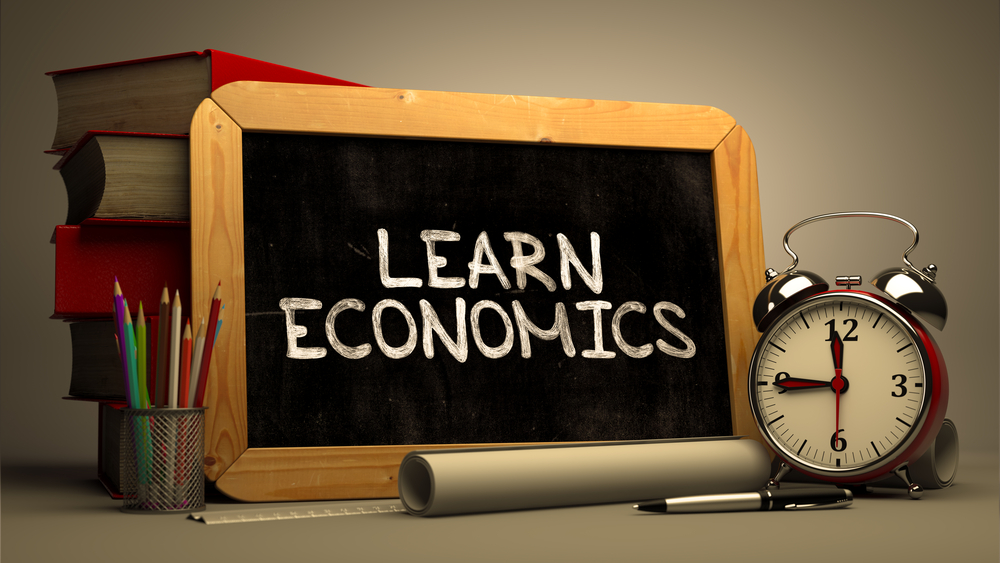There are many ways to learn the ideas of economics. One way is through the standard method – read textbooks or attend lectures where ideas are described. But economics is about human action – which means the lessons of economics can also be found in our own lives. Some people claim that basic econ is often counterintuitive, and it indeed may be to some or most people. But as I began to study economics many years ago, I found its lessons extremely intuitive, because the ideas being described were things I had witnessed or experienced throughout my life.
For example, I found it very easy to envision all the ways people adjust their behavior in response to taxes. I grew up in Washington state, very close to the border with Oregon. There were two big tax differences between those states. (Well, probably more than two, but there were two I cared about at that time.) Oregon had a state income tax, while Washington did not. And Washington had a state sales tax, while Oregon did not.
Both of those were often cited as factors in decisions people would make. As people started getting jobs, it was common to find opportunities that were similarly appealing and equidistant, some in Washington and some just over the river in Oregon. When that happened, people would heavily favor finding a job in Washington, because if you worked in Oregon you had to pay Oregon state income tax, even if you weren’t an Oregon resident. (But even though you were an Oregon taxpayer, you were unable to cast any votes in Oregon – taxation without representation!) But it didn’t work in the other direction – friends I had in Portland didn’t feel any extra incentive to find a Washington job, because even if they worked in Washington, they would still have to pay Oregon state income tax.
However, the sales tax difference made a much more frequent impact. Washington’s sales tax in those days was, if memory serves, around 7.7%. This made it very common for people in Washington to put a little extra effort into driving to Oregon to make a purchase, particularly if it was a large purchase. If you needed to buy a new TV or a new couch, why would you voluntarily choose to pay what amounted to an unnecessary 7.7% surcharge on top of your already expensive purchase? I’m sure that over the years, retailers along the border in Washington lost a considerable number of sales to retailers just along the Oregon border, precisely because people would adjust their behavior in response to taxes.
But at the same time, the sales tax issue wasn’t decisive. If you were going to buy a new TV for a thousand dollars, if often made sense to take the extra ten minutes to drive over the Columbia River and buy it in Oregon to save nearly eighty dollars in sales tax. But if you just needed to make a small purchase, the extra time and gas costs of the longer drive meant it wasn’t worth doing to avoid the 7.7% tax rate. And the further you lived from the Oregon border, the larger a purchase would have to be in order to make you willing to do the longer drive in order to save on sales tax. Though I didn’t know the term at the time, this showed me the importance of transaction costs in our decision making. The choice you will make will be in part influenced by the fact that the choice itself carries its own cost.

One other difference between Oregon and Washington gave me a healthy skepticism of “but it creates jobs!” as a justification for some program or regulation. While I lived in the area, and until very recently, it was illegal for you to pump your own gas in Oregon. By law, you would have to hand your cash or credit card to a gas station employee and have him pump your gas for you. I absolutely hated the experience, because it just slowed the whole process down. It was very common to get to a gas station with eight pumps and only two attendants and have to wait several minutes for one to work his way over to you, tell him you wanted to fill the tank, hand him your card, and have him start filling your tank. Meanwhile he’d wander off to another vehicle, your car would finish filling up, and you’d still be left waiting several more minutes before he got back and put the nozzle away and returned your credit card so you could be on your way. Nothing was more productive as a result of these jobs existing – the whole process just became slower and more time consuming. This made it very intuitive for me to see why economists focus on production, not employment. It’s not about how many people are doing stuff, what really matters is how much stuff gets done. Using more people to achieve the same level of production (or less) isn’t how progress is made.
What about you, EconLog readers? Are there any ideas in economics you learned about and immediately recognized from your own life experience? If so, drop some comments sharing what those ideas where, and where in life you saw them in action.


READER COMMENTS
Richard Fulmer
Nov 22 2023 at 12:26pm
In the U.S. no one haggles over the price of a can of beans or a bag of rice. The pennies we might save aren’t worth the time or the effort. But I’ve been to countries in which people are so poor that a few pennies mean a lot and they do haggle over such things. Here, most of us will still bargain over the price of a house or a car because a few hundred or a few thousand dollars are material to us. However, as we’ve become wealthier, car dealers advertising “no dicker stickers” are becoming more popular.
David Henderson
Nov 22 2023 at 2:22pm
Nicely done.
I was pondering this on my way to work this morning. I might do a whole blog post on this but this is my quick recollection.
One of the things that most economists, including me, believe is that pay is based on the value of one’s output. On the way to work this morning, I heard a song on my FM channel by a young woman complaining that she was underpaid. I realized how often I hear that. Then my next thought was that even when I was in my teens and working in part-time jobs, I always understood that pay was based on productivity. I never told myself I was underpaid. I would then figure out how to be more productive in a job or, more likely, because job performance was constrained in some ways, how to find a job in which I would be more productive.
Ahmed Fares
Nov 22 2023 at 3:27pm
steve
Nov 22 2023 at 5:31pm
Echoing above I would say that both my reading and managing have hit home that incentives matter, with the corollary that it’s not always obvious which incentives are important. There have been times when I misread incentives and times when I asked and people lied to me, so figuring them out is important. Dave mentions compensation and I think he is sort of right but at least in my profession it is also heavily driven by market conditions, basic supply and demand. Output of my midlevels, eg, has increased slightly over the last 20 years but pay has varied pretty widely depending upon local market conditions.
Also on compensation, I remain surprised at how few people understand the concept of total compensation and remain fixated only on salary. Individual financial needs vary so occasionally someone tells me they need the take home and dont care about the retirement plan and other benefits but lots of people dont seem to be able to grasp the idea even after an explanation and bypass much better total compensation to get a small amount of extra salary.
Steve
Monte
Nov 23 2023 at 11:27am
Today is a good day to talk about complimentary goods. Turkey and dressing, mashed potatoes and gravy, green beans with bacon, bread and butter, whipped cream on pumpkin pie. There are no substitutes…
Happy Thanksgiving!
Creigh Gordon
Nov 24 2023 at 1:06pm
The real cost of anything is what you have to give up in order to get it.
Applies to leisure/retirement as well as everything else.
Aysha Ayyoob
Nov 25 2023 at 2:15am
The economics concept which is most relatable to me was relationship between marginal and total productivity in real life .
Law of variable proportion also known as short run production law helps us to envision how high amount of labour in a sector(eg.farmland,factory unit) can lead to decrease in productivity.For eg,If 2 labours are required to operate a machine ,both the labours will work at full capacity and produce an output of 100 units(50 each).suppose two more labours are employed to operate the same machine in the night shift ,then productivity increases to 100 units (total 200 units) but if two more labour are employed for the sake of employment in the morning shift, where already two labours are working ,will reduce productivity and labours will work less than their potential ,therefore TP may increase but MP declines.
Reduction MP is beacuse of many reasons such as- overcrowding→talks and gossiping among the workers →demand to raise wage →low productivity.
I hope it was helpful.
Thank you.
Ahmed Fares
Nov 25 2023 at 3:41pm
The following is a comment from “Economics StackExchange” about the Cobb-Douglas production function:
A link to the Cobb-Douglas production function article mentioned above (opens in a pdf file):
https://www.aeaweb.org/aer/top20/18.1.139-165.pdf
Grand Rapids Mike
Nov 27 2023 at 9:08am
Another contrast showing the effect of differences in taxes and regulation between states can be seen by examining the economic condition of the border cities of Illinois and Iowa. Specifically the Quad Cites area, with Rock Island and Moline on the Illinois side and Davenport and Bettendorf on the Iowa side. The Iowa side cities in this area are thriving the Illinois cities not so much.
Comments are closed.